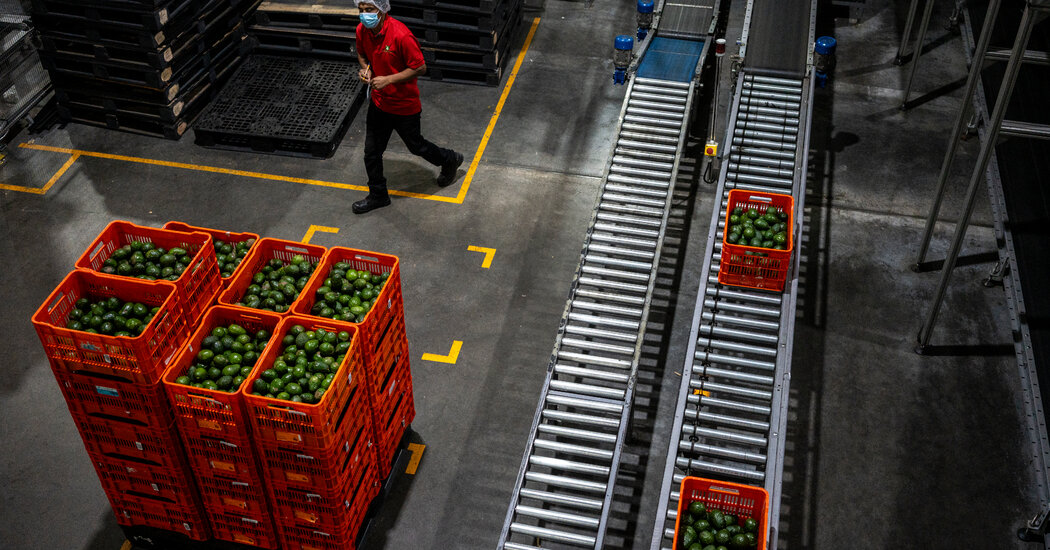Table of Contents
Americans have a growing demand for avocados, and a single state in Mexico supplies nearly all of the fruit eaten in the United States.
This dependency is highlighted when imports are disrupted. The U.S. Department of Agriculture recently suspended inspections of avocados and mangoes scheduled to be shipped from Mexico, citing security concerns for temporary workers stationed in Michoacán, a western Mexican state where criminal groups have been trying to infiltrate the booming avocado industry.
The US ambassador to Mexico said in late June that inspections would resume “gradually” and visited Michoacán last week to meet with state and federal authorities.
Here’s what you need to know about the avocado trade between the United States and Mexico.
Where does the US get its avocados?
The average American consumes more than eight pounds of avocados per year, about three times as much as in the early 2000s. according to the USDA
Most of that rising demand has been met by imports. The United States imported a record 2.8 billion pounds of avocados in 2023, accounting for about 90 percent of the fruit’s supply, up from 40 percent two decades ago. Much of U.S. avocado imports come from Mexico, which is the the world’s best producerlargely in response to rising demand from U.S. consumers. The majority of Mexican avocado production is centered in Michoacán.
California produces about 90 percent of the avocados grown in the United States. But erratic weather patterns linked to climate change, including droughts and wildfires, have put pressure on the state’s farms in recent years, further increasing its reliance on imports.
How important are avocado exports to Mexico?
Mexico’s avocado exports were worth just over $3 billion last year, with about 80 percent of sales going to the United States. From 2014 to 2023, production of the crop increased by about 75 percent, with avocados becoming Mexico’s fourth most valuable agricultural export, after beer, tequila and berries.
Why are US avocado inspectors in Mexico?
Avocados from Michoacán and the neighboring state of Jalisco can be exported to the United States duty-free. Inspectors employed by a USDA unit are checking producers and packing plants in Mexico as part of a program designed to ensure that orchards and other facilities that handle the crops are pest-free and meet food safety standards.
Last week, the U.S. Embassy in Mexico reported that two employees of the U.S. Department of Agriculture’s Animal and Plant Health Inspection Service were assaulted and arrested while traveling in Michoacán, where they were inspecting orchards and packing plants. The workers were later released, but the incident led to a temporary halt in inspections of avocados and mangoes destined for the United States. A “satisfactory” resolution on worker safety allowed the inspectors to return to work, Ken Salazar, the U.S. ambassador to Mexico, said Monday.
How resilient is the avocado supply chain?
Cartels in Michoacán, one of Mexico’s most violent states, have tried to cash in on the lucrative avocado trade, leading to threats, kidnappings and killings. Some indigenous communities have set up security patrols as a line of defense against criminal groups in the area.
The United States also temporarily banned the import of avocados from Mexico in 2022 after a plant safety inspector in Michoacán received a threatening message.
In 2021, authorities in Mexico and the United States agreed to allow avocado imports from Jalisco, in addition to Michoacán. That helps diversify avocado sources, said Luis Ribera, a professor of international trade at Texas A&M University, but the heavy reliance on Michoacán means unrest there will continue to affect the reliability of supplies, he added.
“Just doing business in Mexico, you have to take that into account,” Mr. Ribera said.
Environmental and human rights groups have also warned of widespread and accelerating deforestation in western Mexico to clear land for avocado orchards. In addition to releasing climate-warming gases, deforestation to expand avocado production, which requires vast amounts of water, has depleted the aquifers that many farmers rely on.
In the United States, the California Avocado Commission estimated that the state’s producers would produce 208 million pounds of avocados in the 2023-24 season, the smallest yield since 2008. Climate change, urban development and high water costs have contributed to a decline in the acreage devoted to avocado production in the state’s southern counties, to the lowest level since the 1970s.
Emiliano Rodriguez Mega contributed to the reporting.


